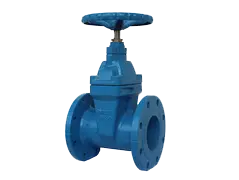
General Guidelines for Selecting Soft-Sealed Gate Valves
The following are the general principles for selecting soft-sealed gate valves.1. System Parameter Analysis
Before selecting soft-sealed gate valves, a comprehensive analysis of the parameters of the pipeline system is necessary, including fluid medium, pressure rating, temperature range, flow characteristics, and pipe diameter. These parameters will determine the material, sealing performance, pressure resistance, and temperature resistance of the selected soft-sealed gate valves.2. Material Selection
Choosing the appropriate material is crucial for soft-sealed gate valves based on the properties of the medium and the requirements of the working environment. Common materials include carbon steel, stainless steel, alloy steel, copper alloys, etc. Each material has different chemical and mechanical properties, and the selection should be made based on specific circumstances.3. Sealing Performance
The sealing performance of soft-sealed gate valves directly impacts the safety of system operation and the risk of leakage. Therefore, when selecting soft-sealed gate valves, particular attention should be paid to the material, structural design, and sealing performance indicators of their sealing components to ensure effective prevention of medium leakage.4. Pressure Resistance Capability
Select the pressure resistance capability of soft-sealed gate valves according to the working pressure level of the system. It is essential to ensure that the rated pressure of the selected valves is greater than or equal to the maximum working pressure of the system to ensure the valves operate safely and reliably.5. Temperature Resistance Performance
Consider the temperature range of the medium and the temperature conditions of the working environment when selecting soft-sealed gate valves with excellent temperature resistance performance. The material, sealing components, and lubrication method of the valve all affect its temperature resistance performance, and the selection should be made based on specific circumstances.6. Operation Mode
Select the appropriate operation mode for soft-sealed gate valves based on the system's control requirements and the characteristics of the operating environment. This includes manual operation, electric operation, pneumatic operation, and hydraulic operation, among others. Ensure that the chosen operation mode meets the system's control needs and is easy to operate and maintain.7. Brand Reputation
Choose a supplier of soft-sealed gate valves with a good brand reputation and excellent after-sales service to ensure product quality and technical support. DERVOS VALVE can provide customized solutions and respond promptly to and resolve customer issues.When selecting soft-sealed gate valves, it is necessary to comprehensively consider factors such as system parameters, material selection, sealing performance, pressure resistance capability, temperature resistance performance, operation mode, and supplier reputation. This ensures that the chosen valves meet the requirements of the system and operate safely and reliably.
